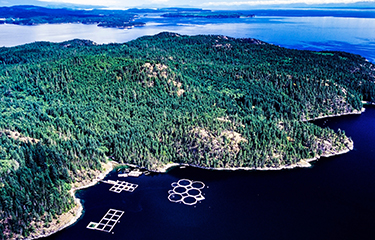Canada's Department of Fisheries and Oceans has launched an engagement effort to start planning a transition away from open-net pen salmon farming in the province of British Columbia.
The move comes just over a month after the department announced it was renewing two-year licenses for marine finfish aquaculture facilities in the region, aside from those in the Discovery Islands. At the time of the renewal, DFO Canada announced it planned to begin a transition process through input from the “government of British Columbia, First Nations, industry, local governments, stakeholders, and British Columbians.”
The DFO announcement holds true to that plan, as the department has announced an “engagement towards a plan” on the transition away from net-pen salmon farming. According to the department’s discussion framework, the engagement will start with an information-sharing process planned to end some time in September 2022.
“Wild Pacific salmon are at risk of disappearing forever if we don’t act; that’s why the government of Canada is taking a wide range of actions to halt and reverse their declining population,” Canadian Minister of Fisheries, Oceans, and the Canadian Coast Guard Joyce Murray said in a release. “We will continue to chart the course forward for aquaculture in British Columbia, one that will support the ecologically sustainable growth of the industry, create jobs, and help keep our waters and marine ecosystems protected.”
Murray’s statement mirrors one made following the license renewal, and the latest plan reemphasizes the department's commitment to consult a wide range of stakeholders including Indigenous leaders, local governments, conservation organizations, First Nations governments, the aquaculture industry, and the public.
“The input and feedback received during these engagement sessions will be instrumental in the development and implementation of the open-net pen transition plan, expected to be finalized in spring 2023,” DFO said in a release.
Murray said the framework is a part of the DFO’s effort to ensure the sustainability of the industry in B.C.
“As the world’s appetite for high-quality fish and seafood continues to grow, we need to find better and innovative ways to farm fish and protect wild Pacific salmon stocks,” she said. “A well-developed transition plan is the first step to growing a viable and sustainable industry in British Columbia.”
The announcement of an engagement process was welcomed by multiple local groups, including the B.C. Salmon Farmers Association (BCSFA).
“The B.C. Salmon Farmers are pleased to read language in the government of Canada’s proposed transition discussion framework that aligns with our current operational values,” BCSFA wrote in a statement.
The Coalition of First Nations for Finfish Stewardship (FNFFS), a group that asserts that salmon farming is “a path to self-determination and reconciliation” for First Nations in coastal B.C., also said it was “cautiously optimistic” about the next steps.
“Our member Nations have been asserting our rights and title to both the federal and provincial governments regarding salmon farming in our waters since March 2022, and today we are encouraged to see how many of our concerns, input, language, and socio-economic data have been woven into the fabric of this framework,” the FNFFS said.
However, both groups said the language of the framework, while encouraging, also poses some challenges given the aggressive timeline – the four-phase engagement strategy will be completed by June 2023, based on the DFO’s estimates.
“Considering the weight of the potential impact this transition plan will have economically and socially on our communities, and the busy fishing season in the coming months for our people, our Coalition Nations call on DFO to extend the consultation process for the open net-pen transition plan into 2024 to ensure proper, respectful engagement for each Nation occurs,” the FNFFS said.
The FNFFS added that it is concerned by the facilitation of First Nations engagement sessions and workshops by the First Nations’ Fisheries Council, as its “stance against salmon farming is well-known,” the FNFFS said.
“As such, our Coalition will continue it sown transition communication, planning, and engagement with member Nations, the sector, and both provincial and federal governments to ensure a fair transition process takes place,” the FNFFS said.
While the timeline of the framework is relatively short, compared to past efforts, it is a change of pace for the DFO. In December 2020, the department suddenly announced that all salmon farms in the Discovery Islands, located in B.C., would be phased out completely in just 18 months, a decision that communities and salmon farmers in the area said they were completely “blindsided” by.
Soon after, local salmon farmers including Mowi Canada West, Cermaq Canada, and Grieg Seafood asked the government for more time to close farms. In some cases, those requests were honored, while in others salmon farmers were forced to cull fish, and Mowi ended up closing a salmon hatchery as a result of the decision.
Currently, salmon farming is still allowed in the Discovery Islands due to a court decision, and the DFO said in the wake of the decision that it will begin consultation with First Nations communities and current license holders in the Discovery Islands “on the future of salmon-aquaculture licenses in this area.”
Photo courtesy of Russ Heinl/Shutterstock







